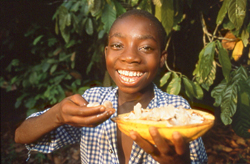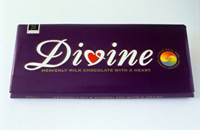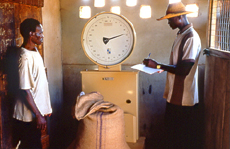|
 Chocolate - food of the gods - we adore it (even if we don't always admit to eating it). Whatever the mood or occasion, chocolate just seems to fit. Bristol University Students' Union has even recognised the beneficial effects of chocolate to students; last term handing out free bars as part of a survival kit during the exam period. But with sales in UK alone worth £3.6 billion annually, chocolate is also big business. How many of us, whilst unwrapping a tasty treat, actually stop to think about where the chocolate comes from; who produces the cocoa - the basic ingredient? Under the current system of trading, cocoa farmers are some of the poorest people in the world. It can cost more to grow the beans than they can actually be sold for. Most cocoa farmers have never even tasted chocolate before; it’s a luxury that they cannot afford. Chocolate - food of the gods - we adore it (even if we don't always admit to eating it). Whatever the mood or occasion, chocolate just seems to fit. Bristol University Students' Union has even recognised the beneficial effects of chocolate to students; last term handing out free bars as part of a survival kit during the exam period. But with sales in UK alone worth £3.6 billion annually, chocolate is also big business. How many of us, whilst unwrapping a tasty treat, actually stop to think about where the chocolate comes from; who produces the cocoa - the basic ingredient? Under the current system of trading, cocoa farmers are some of the poorest people in the world. It can cost more to grow the beans than they can actually be sold for. Most cocoa farmers have never even tasted chocolate before; it’s a luxury that they cannot afford.
Now a company has come along that is offering us the intriguing chance to "change the world with a chocolate bar". And all from the comfort of the Students' Union shop. The Day Chocolate Company produce Divine fairly traded milk chocolate and Dubble, the fair trade crispy crunch with added Comic Relief. The mouth-watering proposition is that by eating Divine and Dubble we are able to make a difference to the lives of small-scale producers in developing countries; such as the Ghanaians who produce the cocoa for those chocolate bars.
 Cocoa farmers in Ghana rely on the income from their cocoa trees to provide a livelihood for themselves and their families. Any fluctuations in the price of cocoa beans have a dramatic effect on a producer’s earnings, which are only around £50 a year to begin with. Since the price is set on the commodity markets, far away in New York and London, producers have little control over what they will earn for the fruits of their hard work. Fair trade is a different way of trading; ensuring that producers are paid fair prices for their goods under secure, long-term contracts so that they can plan for a better future. Divine and Dubble carry the Fairtrade Mark. This is an independent guarantee from the Fairtrade Foundation that the chocolate is made with cocoa beans bought under internationally agreed fair trade terms and conditions. Mr Appiah, the president of Kuapa Kokoo - the co-operative that supplies the cocoa - describes how "the more cocoa we sell to fair trade the more money we have for projects for the farmers, projects such as water wells, schools, toilets…". Cocoa farmers in Ghana rely on the income from their cocoa trees to provide a livelihood for themselves and their families. Any fluctuations in the price of cocoa beans have a dramatic effect on a producer’s earnings, which are only around £50 a year to begin with. Since the price is set on the commodity markets, far away in New York and London, producers have little control over what they will earn for the fruits of their hard work. Fair trade is a different way of trading; ensuring that producers are paid fair prices for their goods under secure, long-term contracts so that they can plan for a better future. Divine and Dubble carry the Fairtrade Mark. This is an independent guarantee from the Fairtrade Foundation that the chocolate is made with cocoa beans bought under internationally agreed fair trade terms and conditions. Mr Appiah, the president of Kuapa Kokoo - the co-operative that supplies the cocoa - describes how "the more cocoa we sell to fair trade the more money we have for projects for the farmers, projects such as water wells, schools, toilets…".
For many students the democratic and representative functions of the Students’ Union are far from their mind. However, for the members of Ghanaian co-operative union Kuapa Kokoo (‘Good Cocoa Growers’ in Twi, the local language) such participatory structures make a real difference to their lives. Kuapa Kokoo is a farmer-owned organisation set up in 1993 so that farmers could work together trading their own cocoa in order to get a better price on the market. The organisation is very successful; having expanded from an initial 23 village societies to over 35,000 members in 650 village societies. The union’s president, Mr Appiah, is rightly proud of Kuapa’s achievements. "We trade for ourselves – we can chose where we sell our cocoa and in KK in each village society we vote democratically for a recorder (the individual who weighs the cocoa) from the village and then we can get rid of him if he cheats. We can weigh ourselves on the scales to check they are right, if not then we will change recorder. We get paid straight away for our cocoa and in cash." Divine and Dubble are a source of great pride for Kuapa Kokoo. In a unique partnership, Kuapa farmers also own a third of The Day Chocolate Company – they have a real input into how the company is run and share in its the profits.
 If fair trade products like Divine and Dubble can capture even a small proportion of the market, producers like those of Kuapa Kokoo can gain real benefits. This is where the chocolate challenge comes in. Divine and Dubble have teamed up with NUS shops as part of nationwide fair trade campaign, and are asking students for help. The challenge is to go into the union shop [UFO] and buy fair trade chocolate. Eat it; share it; even seduce someone with a bar. For students who live off-campus there is no excuse either. Both bars are available in supermarkets, and Dubble is available in selected garage forecourts, Blockbuster video stores and newsagents too. Eagle-eyed consumers should look out for the Fairtrade Mark (a black and white "F" logo), which is on other fair trade products as well. If fair trade products like Divine and Dubble can capture even a small proportion of the market, producers like those of Kuapa Kokoo can gain real benefits. This is where the chocolate challenge comes in. Divine and Dubble have teamed up with NUS shops as part of nationwide fair trade campaign, and are asking students for help. The challenge is to go into the union shop [UFO] and buy fair trade chocolate. Eat it; share it; even seduce someone with a bar. For students who live off-campus there is no excuse either. Both bars are available in supermarkets, and Dubble is available in selected garage forecourts, Blockbuster video stores and newsagents too. Eagle-eyed consumers should look out for the Fairtrade Mark (a black and white "F" logo), which is on other fair trade products as well.
The Day Chocolate Company’s campaign is more than just a great excuse to get munching and feel good about it. Fair trade can be a powerful tool. NUS President Owain James, who backs the campaign, "urges students all across the UK to buy fair trade and to use their consumer power to send a message back to big business and government - we must pursue alternative ways of trading." For those who want get more involved, there’s the opportunity to learn more about fair trade on the website www.divinechocolate.com or even become a ‘Divine Rep’, promoting fair trade chocolate on campus. Email info@divinechocolate.com for that one. And there’s also the Trade Justice campaign if you want to explore and take action on the wider issues of the unfair global trading system. www.peopleandplanet.org/tradejustice/
In the words of Mr Ohemeng, Managing Director of Kuapa Kokoo, "we all have to go shopping, and fair trade is just going shopping with a bit of respect." So go on; take the chocolate challenge. |